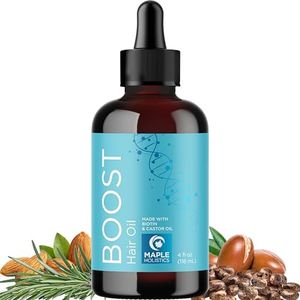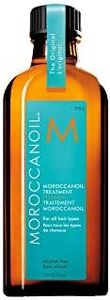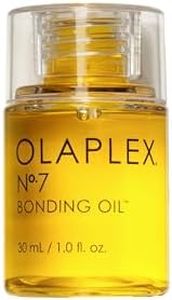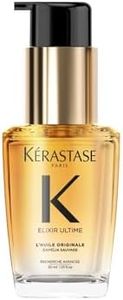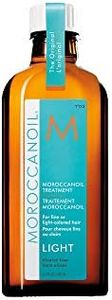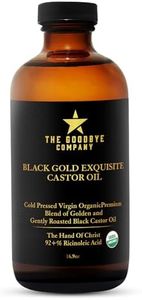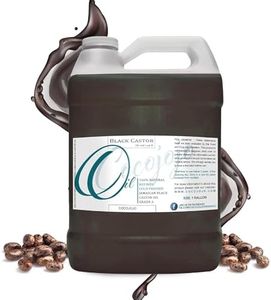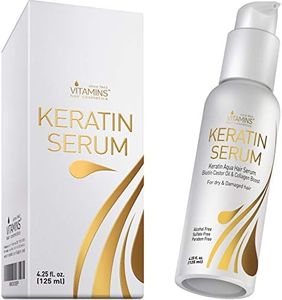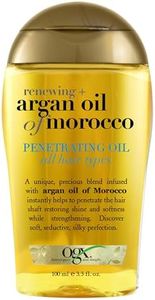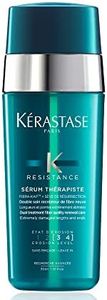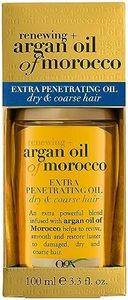10 Best Hair Oils 2025 in the United States
Our technology thoroughly searches through the online shopping world, reviewing hundreds of sites. We then process and analyze this information, updating in real-time to bring you the latest top-rated products. This way, you always get the best and most current options available.

Our Top Picks
Winner
Moroccanoil Treatment, 3.4 Fl. Oz.
Most important from
84450 reviews
The Moroccanoil Treatment, 3.4 Fl. Oz., is a well-regarded hair oil suitable for all hair types. Key ingredients include high-quality argan oil, which is known for its excellent conditioning and moisturizing properties. This oil helps to smooth frizz and flyaways, detangle hair, and increase shine significantly, making it beneficial for those with dry or damaged hair. Its alcohol-free formulation ensures it won't dry out the hair, which is a plus for maintaining moisture balance.
The signature Moroccanoil scent is pleasant and not overpowering, adding a touch of luxury to the experience. The product absorbs relatively quickly without leaving a greasy residue, which is ideal for those who prefer light-feeling hair products. However, as with any product, some people with very fine hair might find it a bit heavy if too much is applied.
The versatility of this oil allows it to be used as a conditioning, styling, and finishing tool. One minor drawback could be its higher price point compared to other hair oils on the market, but its performance and quality ingredients often justify the cost for many users. It's a reliable choice for anyone looking to improve their hair's health and appearance with a single product.
Most important from
84450 reviews
Olaplex No. 7 Bonding Oil, Concentrated High Shine Oil, Heat Protectant, Visibly Smooths & Softens Hair, Added Color Vibrancy, Up to 72 Hour Frizz Control, For All Hair Types, 1 fl oz
Most important from
53208 reviews
The Olaplex No. 7 Bonding Oil is a versatile hair oil designed to suit all hair types, including damaged and color-treated hair. One of its major strengths is its ability to significantly increase shine, with a 125% improvement reported compared to bleached hair without the oil. This product also offers impressive frizz control for up to 72 hours, making it a great choice for those in humid environments. Additionally, it provides heat protection up to 450°F/232°C, which is beneficial for individuals who frequently use styling tools.
The oil's formula is free from sulfates, gluten, aluminum, parabens, and formaldehyde, making it suitable for those with sensitivities to these ingredients. It also promises a 77% reduction in hair breakage, helping to strengthen and protect hair for a visibly healthier appearance. The Olaplex No. 7 Bonding Oil is unscented, which can be a plus for those who prefer fragrance-free products. However, some users may miss the sensory experience that a pleasant scent can provide.
The oil is lightweight and absorbs quickly, ensuring that it does not leave a greasy residue, which is a common concern with hair oils. On the downside, the bottle contains only 1 fluid ounce of product, which might not be cost-effective for those with long or thick hair who require more frequent usage. Despite this, the concentrated formula means a little goes a long way. The Olaplex No. 7 Bonding Oil is a high-performing product that offers multiple benefits such as shine enhancement, heat protection, and frizz control, making it a solid choice for anyone looking to improve the health and appearance of their hair.
Most important from
53208 reviews
Kerastase Elixir Ultime Travel Size L'Huile Original Hair Oil - Hydrating Oil Serum to Smooth Frizz and Add Shine, Strengthens and Provides Heat Protection, For All Hair Types
Most important from
1047 reviews
The KERASTASE NEW Elixir Ultime Refillable Hair Oil is a versatile hair serum designed to smooth frizz, add shine, and strengthen hair. Its lightweight formula, featuring wild camellia oil, is suitable for all hair types, making it a good choice for a wide range of users. The oil is particularly effective at adding shine—up to 92% more—compared to unwashed hair, and it offers significant smoothing and strengthening benefits when compared to non-conditioning shampoos. It also provides heat protection, which is a valuable feature for those who frequently use styling tools.
The product comes in a 30 ml bottle made from 30% recycled glass, which adds an eco-friendly touch. Additionally, its pleasant camellia scent is a bonus for those who enjoy fragranced hair products. However, the small liquid volume may not last long for those with longer or thicker hair, requiring more frequent repurchases. The drop form application is convenient but may take some getting used to for those accustomed to spray or pump bottles.
This hair oil is well-suited for individuals seeking a hydrating and protective hair serum that enhances shine and smoothness, though its smaller size and drop form may be less convenient for some users.
Most important from
1047 reviews
Buying Guide for the Best Hair Oils
Choosing the right hair oil can significantly improve the health and appearance of your hair. Hair oils can provide nourishment, moisture, and protection, but with so many options available, it can be overwhelming to pick the right one. To make an informed decision, it's important to understand the key specifications and how they align with your hair type and needs.FAQ
Most Popular Categories Right Now
